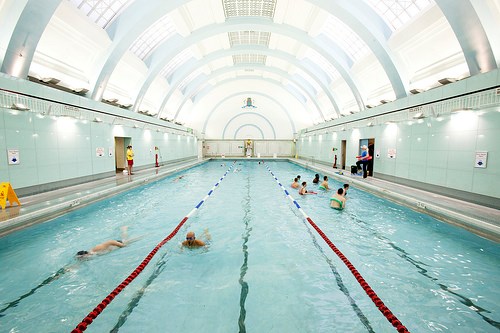The lost legacy of London 2012

Free access to swimming pools is just one of the initiatives meant to acheive a lift in sports participation that lost its funding. Photo: watchlooksee/Flickr
06.06.2012
By Katja HøiriisThe debate on whether the London Olympics will deliver its promised legacy of getting more people to participate in sport and physical activity is picking up speed in Britain. In December 2011, Sport England announced that the number of people playing sport aged from 16-19 had fallen making the Government dump its target of getting at least one million people to become more active by 2013.
The British newspaper the Independent on Sunday has looked into the schemes meant to help reach the target of getting more participation in sports that have had their budgets cut or have completely closed down. The newspaper reports that since London won the Games the budget for school sports has been cut from £162 million to £35 million, resulting in thousands of sports coaches being fired. The Government’s leading proposal for a community sports legacy – free access to swimming pools for the over-60 and under-16 age groups – was also scrapped, along with Cycling England's funding for better cycle routes in 18 cities.
Programmes that promote healthy activity were also cut, writes the Independent. Grants for 1,300 proposed playgrounds were scrapped, while Walking for Health had its government funding stopped and the Scottish budget to promote walking and cycling for 2012-13 was cut by 33 per cent from the previous year.
Quoting a recent nationwide study, the Independent reports that nearly half of the young people feel they lack opportunities to play sport at school. Half of the boys feel pressured into playing mainstream sports, like football, while more than 60 per cent of the girls said efforts to engage them are not working.
A reporter for the Independent, Michael Calvin, directly states that the Games will not leave a legacy of mass participation. He argues that “the Games will not produce leaner, fitter, children. They will not inspire the apathetic, or galvanise the indolent. Obesity rates have tripled over the past 30 years. Participation in 19 sports has declined markedly, over the last two.”
“That should shame Sport England, the quango who have spent £450m in failing to sustain grassroots activity, but it won't. Their idea of Olympic legacy is to entice (some would say bribe) youngsters into so-called "Sportivate" sessions with free tickets for the Games,” he writes.
But Coe suggests that people should not take the declining numbers from Sport England at face value, as they do not reflect what he himself has seen across the country. In his perspective, the numbers seem to be increasing. And, Coe argued in the Telegraph in March, even though it was his Organising Committee that promised increased participation as a key legacy when London won the Olympics, his agency is not responsible for the delivery of this promise.
But according to Coe, the legacy London 2012 set out for has already been reached. This he explains in an interview with sportanddev.org published today 6 June, saying that "I am proud to see the vision we set out during our bid in Singapore of helping millions of children and young people around the world come to fruition," writes sportanddev.org
A report from the think tank the Centre for Social Justice launched in May 2011, looked at the promises made with regards to greater participation and concluded that “the [participation] target was intrinsically flawed from the outset, not just because it was more convincing as a sales pitch than a policy objective, but also because engaging any number of additional people in some unspecified sporting activity is not the same thing as a serious, targeted work aimed at transforming the lives of Britain's neediest people."
Read the report from the Centre for Social Justice here (see chapter 6).
Read also the initial Legacy Action Plan for the 2012 London Olympics from the Department of Culture, Media and Sport published in June 2008 here
Sources: The Independent, BBC, parliament.uk, the Telegraph, report from the Centre for Social Justice
http://www.bbc.co.uk/news/uk-england-london-13484137





